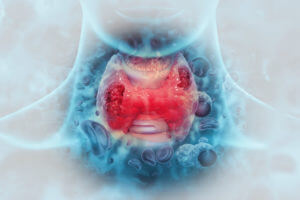
In short:
- Radiation Spread Worldwide: Nuclear tests in the 1940s-1960s polluted food and water.
- Kids Were Most at Risk: Their thyroids absorbed radiation, leading to cancers years later.
- Thyroid Cancer Is Treatable: Most patients recover and live normal lives with care.
Thyroid cancer from radiation exposure is serious. It is one of the most severe health issues from nuclear weapons testing. Between the 1940s and 1960s, these tests released large amounts of radioactive material into the air. They spread harmful fallout over wide areas and affected many people.
Children were at the highest risk. This is because their growing thyroid glands absorbed more radiation than adults did. Years later, scientists found clear links between nuclear fallout and higher thyroid cancer rates. Let us discuss how the testing caused widespread radiation exposure.
How Did Nuclear Testing Expose People to Radiation
Nuclear weapons testing caused widespread contamination. It affected people around the world.
How Fallout Affected Communities
The biggest threat was radioactive iodine (I-131). It was released into the air during nuclear explosions. It settled on farms, in water, and on food supplies.
People unknowingly consumed:
- Contaminated milk
- Tainted vegetables
- Other foods affected by testing
Children were at the highest risk. This is because their thyroids absorbed iodine more quickly than adults.
Communities living near test sites had the greatest exposure. They are known as “downwinders.” Many groups experienced higher rates of thyroid cancer.
The following face an increased risk of thyroid cancer:
- Bikini Atoll residents
- Hiroshima and Nagasaki survivors
- Atomic veterans
- Residents near Nevada test sites
Why Is the Thyroid Sensitive to Radiation
The thyroid is a small gland. It is only about two inches wide. However, it plays an important role in controlling metabolism.
It absorbs iodine from the blood to produce essential hormones. Sadly, the thyroid cannot tell the difference between regular iodine and radioactive iodine.
In childhood, even small amounts of radiation increased the risk of cancer. A child’s thyroid absorbs iodine more actively than an adult’s. This makes it more vulnerable to radiation damage.
Children are the most at risk. However, adults exposed to radiation can also develop thyroid cancer. Still, their risk is lower compared to those exposed as children.
What Increases the Risk of Thyroid Cancer After Radiation Exposure
A few factors affect a person’s risk of thyroid cancer after radiation exposure.
Radiation Dose and Timing
Higher radiation doses increase the risk of cancer. Even small amounts of radiation can be harmful. This is especially the case for children.
Scientists say no amount of radiation is completely safe. Any exposure can damage cells and possibly lead to cancer.
Thyroid cancers often take 10 to 30 years to appear after exposure. This makes it hard to connect specific cases to nuclear tests. However, studies show higher cancer rates in communities exposed to radiation.
Molecular Clues
Genetic testing has found specific patterns in thyroid cancers caused by radiation. Changes in genes are common in these cases. This includes RET/PTC rearrangements.
These genetic markers help doctors confirm if a cancer was likely caused by radiation. This research strengthens the link between nuclear testing and thyroid disease. It separates radiation-related cancers from other types.
Other Risk Factors
These can affect the chances of getting thyroid cancer after radiation exposure:
- Family history
- Genetic conditions
- Gender (Women)
- Hormones
What Should You Avoid If You Have Thyroid Cancer
Do you have thyroid cancer? If so, avoid needless radiation exposure. Only get medical scans that use radiation when you really need them. For example, get the scan if it can help with your diagnosis. You can undergo them for treatment too.
You should also follow your doctor’s advice about iodine. Some treatments may require you to avoid foods high in iodine briefly. Meanwhile, others might involve taking iodine supplements as part of your care.
Do Patients Receive Radiation Therapy for Thyroid Cancer
Yes, many thyroid cancer patients are treated with radioactive iodine. This is according to the Mayo Clinic. However, this medical treatment is controlled. It is very different from harmful radiation exposure from fallout.
Doctors use radioactive iodine sometimes. They use it to destroy any remaining cancer cells after surgery.
The thyroid naturally absorbs iodine. Due to this, the treatment targets cancer cells directly while causing little harm to healthy tissue.
Nuclear fallout exposed people to uncontrolled and widespread radiation. Unlike it, medical therapy uses precise doses. They are administered under strict guidance to ensure safety.
How Long Can Someone Live With Thyroid Cancer
Papillary thyroid cancer is the type most often linked to nuclear fallout. The Cleveland Clinic says it usually responds well to treatment.
Many people live for decades after being diagnosed. With early detection and proper care, most patients have a normal life expectancy. Regular check-ups help catch any return of the cancer early.
Treatment usually includes surgery to remove the thyroid gland. It is then followed by radioactive iodine therapy.
After that, patients might need hormone replacement medication. They do this for the rest of their lives. The medication keeps their body functioning normally.
Compensation for Thyroid Cancer From Radiation Exposure in Arizona
Atmospheric nuclear testing exposed many people to harmful iodine. This led to thousands of cases of thyroid cancer from radiation exposure. Learning about this history helps us understand today’s health patterns. It also highlights the long-term impact of nuclear fallout on human health.
Ongoing research into radiation-related cancers is crucial for affected groups. Early detection through screening programs improves treatment outcomes. It is also important to continue supporting the affected people and families. Trust the Cancer Benefits Center for Downwinders®. We have a team of highly experienced providers who can determine your eligibility and file compensation for thyroid cancer on your behalf.
Fill out our registration form today to get started. We will contact you directly.
We look forward to serving you!
